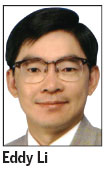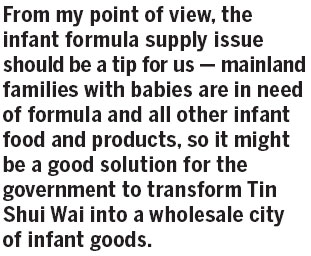New way to help Tin Shui Wai
Updated: 2013-04-11 06:05
By Eddy Li(HK Edition)
|
|||||||
Remotely located, lacking employment opportunities and beset by family tragedies, Tin Shui Wai is often described as the "Town of Sadness". That's why people, for a long time, have been concerned about how we can help improve the life of its residents by providing more jobs and revitalizing the economy.
Last year, on a non-profit-making basis, the government allocated HK$10 million to the Tung Wah Group of Hospitals to operate and manage the Tin Sau Bazaar, on a 38,000-square-foot piece of land at Tin Sau Road, Tin Shui Wai, on a 5-year tenancy. The government's target is obvious: to increase opportunities for people to start their own businesses or find jobs, and to boost Tin Shui Wai's economy.
The market was officially opened for business in February. But subsequent stories in newspapers and magazines have suggested that business is languishing.

I therefore took some time to visit the bazaar and found the report to be largely accurate. Twenty percent of the 182 stalls are closed. Given that I saw only two groups of elderly tourists visiting the market, it seems numbers aren't satisfactory for stall owners to survive. Moreover, among those who went there, the majority wouldn't choose to buy anything in the bazaar, as the goods are too common to attract customers.
Short of distinguishing features, most stalls provide only the low-end clothes and bags or vegetables and fruits. Poor facilities worsen the situation: the market adopts mobile public toilets, the stall layout is square instead of straight, which is more convenient for shopping and the walkways are all in the open, with no awnings to keep out wind and rain.
Some stall owners told me that regardless of the 8-to-8 operating hours, business is so bad many only open in the afternoon. Some hawkers who used to attend hawking activities in the "morning bazaar" said that all-day takings in the Tin Sau Bazaar are not even half of those in the morning bazaar. Although the monthly HK$ 1,000 rental is much cheaper than other stalls in the district, owners are struggling to survive. It is expected that customer quantity will drop even more in the coming hot summer days.
This poor situation, however, doesn't surprise me. The main reason lies in the two sides overseeing the bazaar - the operating and managing group is the Tung Wah Group of Hospitals, which lacks professional business experience and knowledge; and the stall owners, who come from the grassroots community, only sell common goods.
Moreover, there is nothing convenient about the transportation for such a remote place: there are no signs for Tin Sau Bazaar inside or outside the station on the West Rail Line or the cycle track at Tin Shui Wai. Visitors still need to cross a playground to reach the bazaar after getting off at Tin Sau light rail station.

A key point in boosting the local economy is to attract customers outside the region. The authorities should refer to some successful cases, such as the Hong Kong Brands and Products Expo, Lunar New Year Fairs, and so on, to establish some selling points to attract non-local residents.
Tin Sau Bazaar appears unable to save itself, let alone stimulate the economy in the district. From my point of view, the infant formula supply issue should be a tip for us - mainland families with babies are in need of formula and all other infant food and products, so it might be a good solution for the government to transform Tin Shui Wai into a wholesale city of infant goods.
Because Tin Shui Wai is located close to Shenzhen and with sufficient lands and work labor, it would be a feasible project. As long as the government is willing to take responsibility for promoting the district, coordinate between suppliers and purchasers, and establish a trading platform for local residents, it can benefit in three ways: it will create jobs and improve employment, push forward the upgrading and transformation of Tin Shui Wai's economy and help redistribute the currently overcrowded mainland visitor situation in Sheung Shui and Fanling.
The author is vice-president of the Chinese Manufacturers' Association of Hong Kong.
(HK Edition 04/11/2013 page9)